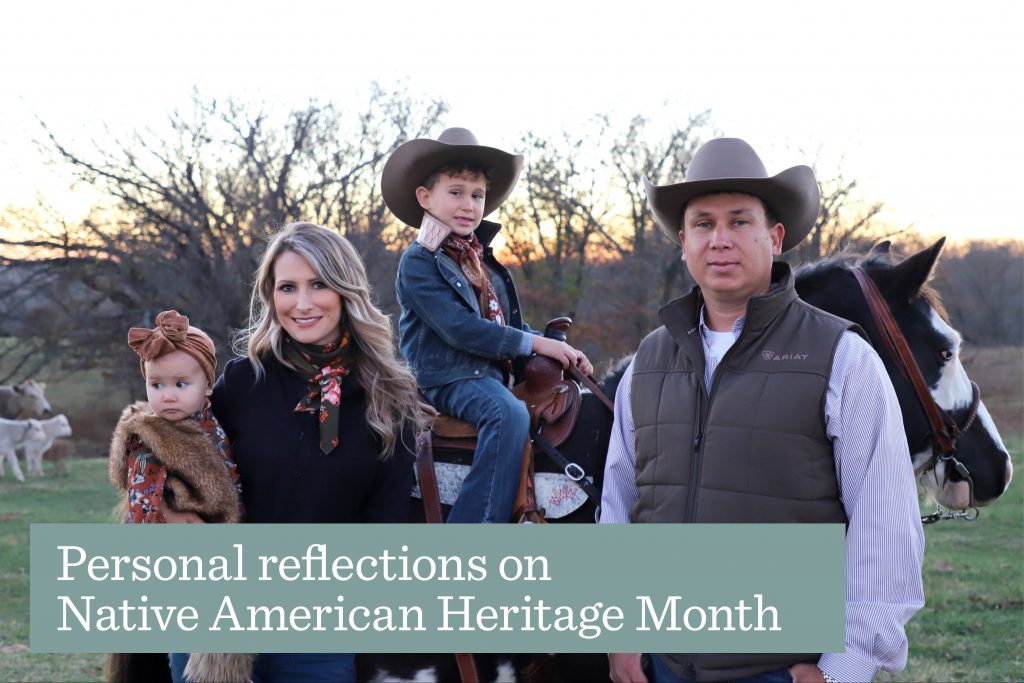November brings a meaningful season to celebrate and recognize family. I am proud to celebrate my heritage during National Native American Heritage Month.
My family and I are citizens of the Cherokee Nation, the largest federally recognized tribe in the United States. We were raised harvesting deer and fowl in the crisp fall air and foraging the woods for freshly sprouted wild onions and morel mushrooms in spring – all traditions passed through the generations of Cherokees before us.
This month marks 30 years since Congress declared November National Native American Heritage Month. The timing is important, as the harvest season has always been a time of thanksgiving and festivity for natives.
My tribe celebrates the Cherokee National Holiday every September – a public annual event that attracts more than 100,000 visitors to our capitol in Tahlequah, Oklahoma. The Holiday showcases a powwow, parade, market for Cherokee artisans to sell their handmade crafts, and a vendor area to try traditional foods like fry bread and more.
To gain a deeper understanding of this vital part of our nation’s history, the following information is a great starting point.
Observe
Many tribes share their traditions and culture with spectators during the fall. The Crow Fair Celebration held by the Apsáalooke of the Crow Indian Reservation takes place in Montana every August. It’s one of the largest powwows in the world and something everyone should have the opportunity to experience at some point in their life.
The Choctaw Pow Wow in Durant, Oklahoma offers a colorful grand entry and crafts. Their powwow has a rare category for tribal women, where they are honored as the givers of life. The Thunder & Lightning Powwow in Southern California welcomes other nations to join them in sharing their dances and heritage. Natives from all over the country travel to dance alongside the Morongo Band of Mission Indians in their unique regalia during the gathering.
While many of these events were cancelled or live streamed this year, these observances, in conjunction with Native American Heritage Month, help bring awareness to our rich history and culture that dates back long before Columbus set sail – long before the first and most devastating season of change came to our people.
Educate
There are several ways to learn more about the history of our ancestors and the many tribes still spanning our continent today. The resilience of natives lives through the sovereignty of our many nations: 574 self-governing tribes and villages spanning the United States.
The Museum of Native American History, located in Bentonville, Arkansas, offers historical and educational content, language courses and streams many of their ongoing events online. The National Museum of the American Indian in Washington, D.C. features informative cinemas, exhibitions, live webcasts and an extensive artifact and art collection spanning 12,000 years.
The National Museum of American History is offering a Social Studies Online episode specifically for Native American Heritage Month. The Library of Congress also has a full calendar of films, webinars and online events to begin your journey of discovery, and local museums, heritage centers and historic sites operated by tribal nations across the U.S. offer a rich and personal journey through the history of their tribes.
Knowledge and consideration are key to empathetically viewing our world and those around us, and these educational opportunities allow for a more holistic understanding of the sovereign nations on which this country was built.
Respect
One of the most important things to remember while observing Native American Heritage Month is we are alive and well. We are your friends and your neighbors.
While there are many injustices that can still be felt deeply, our tribes are thriving – we are hard at work passing down the very best parts of our history to our children and grandchildren. Please remember our regalia, our names, our lands and more hold strong significance in our cultures, and many are sacred and spiritual.
At Tyson Foods, we have a strong theme that resonates throughout our enterprise: #TysonTogether.
Together, we can learn to be thoughtful in our appreciation and admiration of the diverse cultures, perspectives and beliefs within our business – and beyond.
Alicia Buffer
I encourage you to take some time this month to learn about the past and present of Indigenous Americans as you gather carefully with your friends and family for your own season of thanksgiving.

